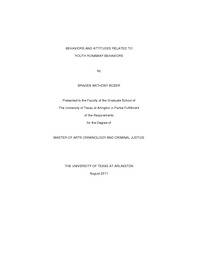| dc.contributor.author | Bozer, Braden Anthony | en_US |
| dc.date.accessioned | 2011-10-11T20:48:22Z | |
| dc.date.available | 2011-10-11T20:48:22Z | |
| dc.date.issued | 2011-10-11 | |
| dc.date.submitted | January 2011 | en_US |
| dc.identifier.other | DISS-11261 | en_US |
| dc.identifier.uri | http://hdl.handle.net/10106/6154 | |
| dc.description.abstract | The purpose of this study was to examine running away behaviors related to certain attitudes and behaviors during childhood and adolescence. Data for this study was collected from 206 students that filled out a self report questionnaire while attending the University of Texas at Arlington during the Fall semester of 2010 or Spring semester of 2011. The main point of this research was to examine attitudes and behaviors that caused participants to have runaway thoughts or actually run away. Other variables observed were gender, family structure, and parent's education level. Two logistic regressions were run. Depression was the behavior that was correlated the most with having running away thoughts. Skipping school was found to be correlated the most with running away. Gender was found to not be statistically significant in predicting youth running away. Youth that were part of a blended or single family were found to be more likely to have had runaway behaviors. Lastly, parents of youth that ran away were found to have higher education levels than parents of youth that did not runaway. | en_US |
| dc.description.sponsorship | del Carmen, Alejandro | en_US |
| dc.language.iso | en | en_US |
| dc.publisher | Criminology & Criminal Justice | en_US |
| dc.title | Behaviors And Attitudes Related To Youth Runaway Behaviors | en_US |
| dc.type | M.A. | en_US |
| dc.contributor.committeeChair | del Carmen, Alejandro | en_US |
| dc.degree.department | Criminology & Criminal Justice | en_US |
| dc.degree.discipline | Criminology & Criminal Justice | en_US |
| dc.degree.grantor | University of Texas at Arlington | en_US |
| dc.degree.level | masters | en_US |
| dc.degree.name | M.A. | en_US |

